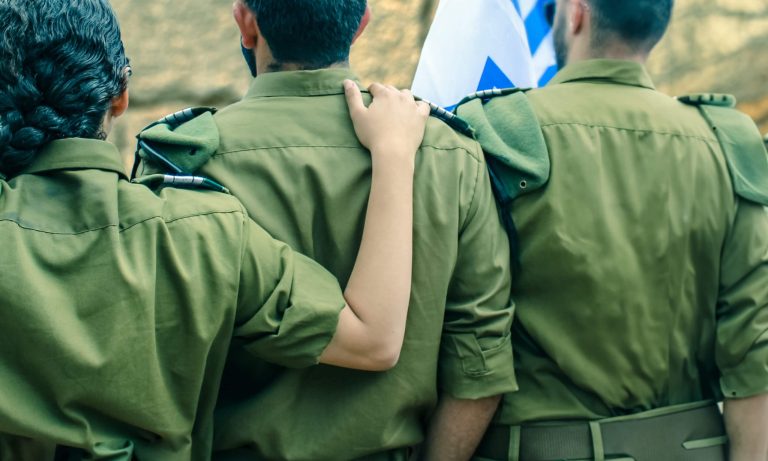By Shoshana Schwartz
Reprinted with permission of Mishpacha Magazine.
I had a full workload, a to-do list as long as the spaghetti they served for lunch here at Retorno rehab center. But as I made my way toward my office, Rabbi Eckstein waylaid me, calling me to his office.
“Do your work here at my desk,” he said. “Pretend you’re a tree.”
A tree?
“Quick, make yourself busy.”
Quick, as in, don’t ask questions.
I didn’t ask questions. I opened my laptop, and before it finished booting, in walked a teenage girl. She was on the short side, a few growing years still ahead of her. Long, black hair flowed down over her shoulders, too-long bangs hid part of her face, a shield between her and the rest of the world.
“Have a seat,” Rabbi Eckstein told her.
She threw a glance in my direction.
“Ignore Shoshana. She’s a tree.”
I smiled a greeting. A few months ago, Ayala had participated in a horseback riding workshop I helped run. The workshop helped her realize she needed treatment for her drug addiction, which is how she ended up at Retorno. So while we had never schmoozed individually, we had bonded, and we always said a friendly hello.
But today I was a tree.
“I’m leaving,” Ayala announced. “Today.”
“Not a good idea,” Rabbi Eckstein said.
“I don’t care. I’m leaving.”
“What about the charges?”
Ayala paused. “What charges?”
“The shopkeeper. For stealing. Remember?”
She paled. “He said he wouldn’t file charges.”
“As long as you’re here,” the rabbi corrected her. “If you leave early, he’ll file.”
She waved her hand. “It’s a bluff.”
Rabbi Eckstein leaned forward. “Shall we find out?”
Ayala’s arms folded in front of her. “Yes.”
He pulled out his phone and dialed. There was no answer.
“It makes no difference,” Ayala said, “I’m leaving.
I don’t belong here. I can stop any time I want. I’m not an addict, I just like to smoke every once in a while.”
“How often is once in a while?”
“What’s the difference?”
“How often?”
“Every few days. Maybe every day. Whatever.”
She crossed her legs. “I just don’t want to be here anymore!”
The rabbi nodded.
“Call my parents,” Ayala said. “Tell them to come get me.”
Rabbi Eckstein complied. There was no answer there, either.
Ayala squirmed. “I’ll stop by myself.”
Silence.
“I’ll prove it. I’ll go home, and if I don’t smoke for two weeks, then I know I can stop on my own. Okay?”
Rabbi Eckstein smiled. “We love you.”
I smiled, too. It’s the standard response, but not because it’s a “line” we use. We mean it. We, all of us, are a family. And we love each other, even when we hate the disease that ravages so many lives. So many lives.
“Shoshana,” the rabbi said, surprising me, “what do you say to Ayala going home?”
My eyes must have telegraphed my confusion.
I was a tree.
“Now you’re a talking tree,” he said, as if that would explain everything.
Of course.
“Ayala, do you really want to know what I think?” I asked.
“Yes.”
“Do you like horses?”
“Um, yeah.”
“Me, too. You know what I like about them?”
“No.”
“They teach me about me.”
One eyebrow formed a neat arch.
“You remember when Sharoni said she’d stopped stealing?”
“Yeah. Our last ride.” The stare became a glare.
That was the day Ayala had decided to enter treatment. “I made a mistake,” she blurted.
“You —”
Ayala turned back to the rabbi. “Try my parents again.”
Rabbi Eckstein nodded. “Shoshana, please call them. I’ll be back.”
He left the two of us alone.
I called Ayala’s parents, ignoring her pleas to speak to them directly. They were on their way.
Ayala was aggravated.
And I was left wondering, now what?
Was I supposed to entertain Ayala until the rabbi came back? Help her understand her motivations? Try to get her see what she’s accomplished since she’s been here?
I fell back to safe territory — horses. Sooner than I expected, Rabbi Eckstein came back.
I stood, poised for flight.
The rabbi had other ideas. “Take Ayala to the women’s clubhouse. Ayala, tell them your dilemma. If even one of them says you should leave now, I’ll personally come pack your bags for you.”
“Shall we?” I said.
No, we shan’t — Ayala didn’t want to speak to the women, five, ten, even thirty years older than her. The past was hard enough to deal with; she had no interest in looking at her future.
I tried not to keep checking the time.
My cell phone rang. It was the secretary.
Ayala’s parents had arrived, and I should keep Ayala in the office while the rabbi spoke to them.
So I stayed, feeling like a glorified babysitter.
I decided to stop worrying about my work. “Let me ask you a question.”
She nodded.
“What are you afraid of?”
I wasn’t really expecting a straight answer, which was just as well, because I didn’t get one.
Instead, her eyes darkened. I let her be with herself for a few minutes.
“We love you,” I said.
She looked away. “I’m not afraid!” She meant to scream, but her voice cracked.
I see this a lot in treatment. Just when someone is about to take a big step forward, she gets cold feet. She’s afraid of getting better.
Because addiction fills a hole — a dark, scary hole — and without it, a person feels like she’s being thrown into an ocean without ever having learned to swim.
People feel safe holding onto their destructive patterns, their painful emotions.
Anger? Protects me from getting close to others. Grudges? Means people owe me for having messed up. Depression? Keeps me down so I don’t have energy to work hard. And fear? Fear is the biggie. The monster, the hurricane, the bottomless pit.
I told Ayala about the first time I rode a horse on Retorno’s trails, how from the vantage point of a saddle at the edge of a rather steep hill, my confidence melted. I talked about my fears — fear of heights, fear of falling, fear of not succeeding.
I wasn’t just talking about the horse.
She got that.
We didn’t discuss her fears. We talked about other things, and I stopped worrying if I was saying the right things, I just let the real me speak, let the connection spark. After a while, she mumbled, “Another person I can talk to.”
I smiled. We love you. I didn’t say it out loud this time. I didn’t have to.
Ayala stood, shaking off the moment.
She was leaving, and she needed to find her parents. Now.
I called the secretary. She said Ayala could go back to her group and didn’t I know I was only to keep her there for a minute?
My “work” didn’t get done this morning. I tried to make peace with that, but I wondered if it had been worth all that time.
An hour ago, I heard Ayala had decided to stay. I had to sit down. When a kid leaves treatment early, it doesn’t bode well for them. When a kid — or an adult — is prepared to work hard, stay clean, and face their fears, they have a real chance to live a fulfilling, wholesome life.
Ayala spoke to at least ten people about leaving. I was only one of them. Did I have anything to do with her decision to stay? I don’t know. I can’t know. But maybe, just maybe, I helped tip the balance.



